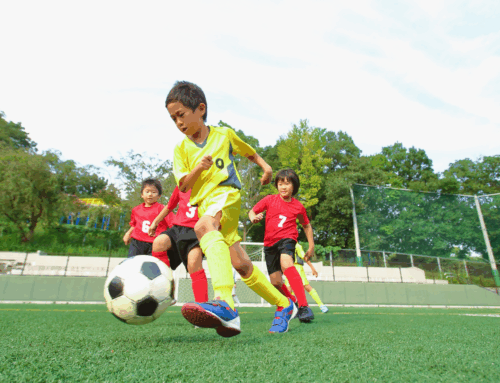Get our exclusive report. Download the iSport360 Club Switching Report Here – For Club Admins, Rec Leaders and Coaches.
5 Simple Ways Parents Can Lift Team Spirit
I’ve been on teams where parents created this amazing supportive energy, and I’ve been on teams where the sideline tension was so thick you could cut it with a knife. The difference wasn’t the kids’ talent or the coach’s strategy—it was how the adults showed up.
Team spirit isn’t about banners, swag, or themed snacks (though let’s be honest, the snacks don’t hurt). It’s built in small moments: how we talk from the sidelines, how we welcome new families, how we recover after tough calls. Here are five moves any parent can use to lift the whole team—no fundraising required and no crafting skills needed.
1. Set the Sideline Tone
Kids hear everything, and I mean everything—including that muttered comment about the ref’s eyesight. When parents cheer effort and let coaches coach, the field feels safer and more focused. Keep language simple and specific: “Great hustle,” “I love that pass,” “Way to support your teammate.” Save the play-by-play commentary and tactical advice for the coaching staff—they didn’t ask for our input, and trust me, they don’t want it.
Model respect for officials, even on the rough days when their calls seem to defy the laws of physics. A calm, encouraging sideline helps players take risks, learn faster, and enjoy the game longer. Plus, you’ll avoid becoming the parent other families whisper about in the parking lot.
2. Build Tiny Rituals That Stick
Rituals glue groups together, and the best ones are simple enough that nobody forgets them by the third week. Try a two-minute pregame or postgame moment that becomes “just what we do.” A quick circle with a deep breath before warm-ups can settle nerves. A high-five tunnel after the final whistle sends every kid out with a win, no matter what the scoreboard says.
End with three shout-outs: one for effort, one for attitude, one for teamwork. Keep it short, keep it positive, and do it every time. The goal is creating something the kids look forward to, not a ceremony that requires a program and assigned seating.
3. Make Welcome a Habit, Not a Gesture
New families often feel like outsiders for the first few weeks, standing awkwardly by their cars while everyone else seems to know the secret handshake. Close the gap on day one. Learn and use every player’s name, and make a point to pronounce them correctly—it matters more than you think.
Send a quick “Glad you’re here—text me if you need anything” in the team chat. Pair newcomers with a “buddy family” who can answer simple questions like field location, warm-up times, or where the team tends to congregate. Inclusion doesn’t happen by accident; it happens because someone starts it, and that someone might as well be you.
4. Be the Coach’s Quiet Ally
You don’t need a title or a whistle to make a coach’s life easier. Arrive on time so practice can start on time instead of with the usual five-minute hunt for missing players. Help gather cones and balls at the end so the coach can finish a teaching point instead of sprinting around the field like they’re collecting Easter eggs.
Offer to run a simple warm-up line or shag balls during drills if asked—but only if asked. Keep younger siblings off the playing area without being reminded seventeen times. The two most useful words a parent can say are “On it.” When adults handle logistics smoothly, coaches can focus on coaching and players can focus on playing.
5. Handle Conflict Like a Pro
Disagreements are inevitable when you put competitive parents together for an entire season. How we handle them shapes the culture more than the disagreement itself. Use a personal “24-hour rule” for heated topics: sleep on it, then reach out calmly and privately if it still matters in the morning. You’ll be amazed how many “urgent” issues resolve themselves with a good night’s sleep.
Start with curiosity, not accusation: “Can you help me understand the rotation from today?” works so much better than “Why didn’t my kid get equal playing time?” Praise publicly, question privately, and keep the team chat free of rants that make everyone else uncomfortable. One parent modeling restraint can diffuse an entire sideline before things get awkward.
Pick One, Make It a Habit
Culture changes when a simple action gets repeated consistently. Choose one of these moves this week and own it. Maybe it’s the three shout-outs after every game. Maybe it’s being the “On it” cleanup crew. Maybe it’s the quiet, steady cheering that keeps the focus on effort and teamwork instead of the scoreboard drama.
No money needed—just intention, consistency, and a belief that small actions add up to something bigger for every kid on the field. Because at the end of the day, the memories kids take from sports aren’t usually about the trophies or the stats. They’re about feeling supported, included, and part of something special. And that starts with how we show up.
Ian Goldberg is the CEO of Signature Media and the Editor of the largest and fastest growing sports parenting newsletter. He’s been recognized as an industry expert by the National Alliance for Youth Sports, the US Olympic Committee’s Truesport, and the Aspen Institute’s Project Play. Ian is also a suburban NJ sports dad of two teenage daughters and has over 2,000 hours of volunteer time coaching them (which he calls the most fun form of R&D for his newsletter content). Ian and his team provide players, coaches, parents and program directors with the articles and content they need to have a great sports season. Ian has spent most of his career in digital product development and marketing and got his start at the White House where he worked for the economic advisors to two US Presidents.
Learn more or request a demo of our youth sports software that is helping teams improve communication, organization and player development.
September 10, 2025





